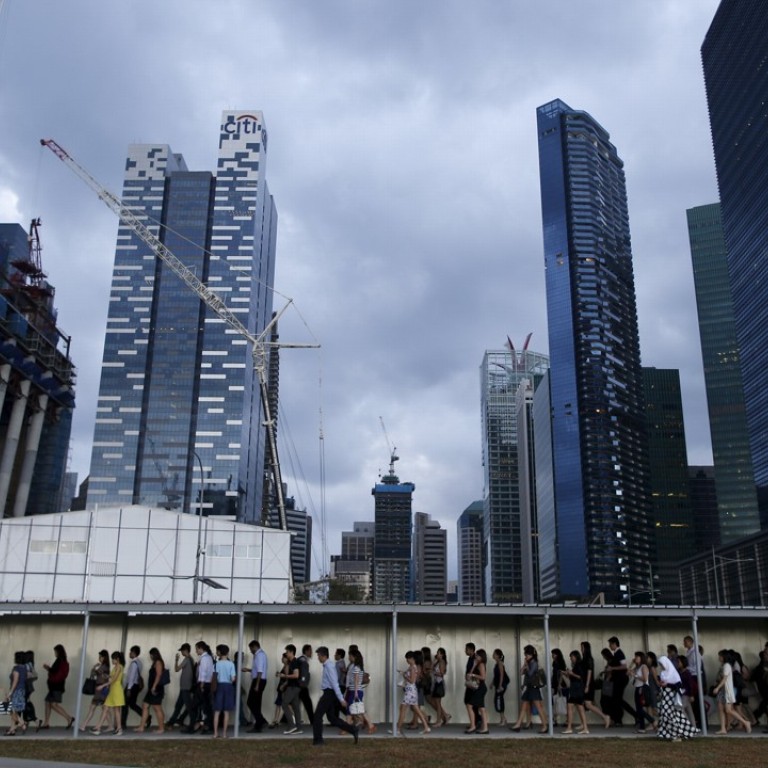
Letters to the Editor, December 18, 2017
HK can catch up with best smart cities
I agree with a recent survey showing that Hong Kong trails a number of cities including Singapore in the global technology index.
One factor is that Hong Kong has been a late starter in its efforts to become a smart city. When many metropolises had already launched initiatives Hong Kong was still only at the development stage.
We became complacent because of commercial and financial success and failed to realise the importance of always moving forward and upgrading.
We have relied too much on the tourism and retail industries and the government invested in these sectors at the expense of research and development in new technology.
Also, local schools have failed to give prominence to technology (especially science) in their curriculums so we have not offered sufficient training to the future workforce. Schools must find ways to encourage more pupils to study science.
Curriculums should be more practical so pupils can apply what they learn in their daily lives, advance their careers and help society. We can only become a smarter city with more government subsidies and that investment must be in the right areas.
There must be more research institutes offering resources to students who want to specialise in studying and researching new technology.
We should also cooperate with institutions north of the border and recruit mainlanders to take technology jobs when a local cannot be found.
Zoe Wong Ying-lok, Tuen Mun
Dim the lights by raising awareness
As your correspondent pointed out, the city’s bright lights can confuse animals and affect their life cycles, because they do not know when it is time to rest. And local residents can also be adversely affected in urban areas by bright lights preventing them from sleeping.
The government should do more to raise levels of awareness so that firms and individuals act more responsibly and try to cut back on the use of bright lights, especially late at night.
Heidi Wong Wong Hoi-ching, Kowloon Tong
Make the effort and chat to taxi drivers
I like Hong Kong taxis. They are convenient and affordable, and a part of everyday life in this city.
It is deplorable that taxi drivers receive so many complaints throughout the year, according to official statistics. Some of these complaints are probably unfounded. As some drivers have told me, they do occasionally get passengers who are intolerably rude and fastidious.
There have been attempts by the government to increase the competitiveness and quality of service provided by the trade.
Introduction of the franchised premium taxi scheme, e-payments and recent talks on car-hailing services are just a few. More has to be done. These piecemeal efforts are not comprehensive enough.
I enjoy chatting with the driver on a taxi ride. Most of them are ready to share the wealth of experience and knowledge they have. The conversations are mostly delightful. They brighten up the journey while increasing my knowledge on topics of common interest to local citizens.
Imagine yourself being confined to the space of a vehicle for up to 10 hours a day without anybody to talk to.
Just think how boring it must be for them. So I urge readers to be kind. Next time you take a taxi, talk to the driver.
Promote the Hong Kong spirit of friendliness. I am sure you will be amply rewarded.
Jacqueline Kwan, Mid-Levels
Waste charge will change our bad habits
In many developed cities, there is a lot of food waste and Hong Kong is no exception.
So often you see people in restaurants not finishing their meal and seldom do they ask for a container so they can take it back home with them.
Given this wasteful attitude, I support the government’s proposed waste charge. I think it will help to change attitudes and encourage citizens to throw out less and recycle more.
Householders will really think twice when they know they must pay more if they fill up that second rubbish bag. Eventually, we will see a reduction in the volumes of waste generated.
Sisca Chan, Tseung Kwan O
Throwaway culture harms environment
Fast fashion [where cheap designs are moved quickly from the catwalk to stores to meet demand] is very popular with Hong Kong shoppers, especially women.
They are influenced by adverts, especially if clothes are being worn by celebrities. But as quickly as they are bought they are often discarded, ending up in landfills, causing pollution and damaging the environment.
The factories ramping up their production schedule to meet demand also exacerbate pollution problems with their emissions and the manufacturing process, which uses chemicals.
Consumers have to act responsibly. Rather than just throwing away items of unwanted clothes they should put them into the appropriate recycling bins. If they are in good condition they can be used again.
Also, people should look for second-hand clothes in charity shops as they are often of good quality and can be worn again.
We all need to try and be more environmentally friendly when purchasing and disposing of clothes.
Carly Fung, Hang Hau

